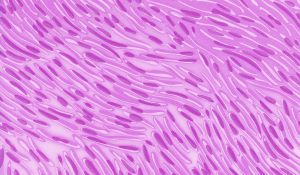What Are the Types of Mesothelioma Cancer Cells?
Cells in the mesothelium, which is the lining of important body parts like the abdomen, lungs, testicles, or heart, can turn into cancer cells if they are exposed to asbestos. These cancerous cells are known as malignant mesothelioma.
Here are the three main mesothelioma cell types:
- Epithelioid: The epithelioid cell type makes up more than 50% of mesothelioma cases, according to the American Cancer Society (ACS). Thankfully, it is also the easiest mesothelioma cell type to treat and has a better prognosis and survival rate than the other cell types.
- Sarcomatoid: These rare mesothelioma cells are recognized by their large size and spindle shape. Only 10-20% of patients have sarcomatoid tumors. It is the hardest type of mesothelioma cell to treat and has the poorest prognosis
- Biphasic: Biphasic tumors contain both the sarcomatoid and epithelioid mesothelioma cell types and account for 20-30% of cases. If a patient has more epithelial cells than sarcomatoid cells, their cancer will normally respond better to treatment.
Doctors diagnose mesothelioma cell types by removing a small tissue sample from the affected area and examining it under a microscope. Each mesothelioma cell type responds differently to specific treatments, so correctly identifying the cell type is key to improving your mesothelioma prognosis.
Get our Free Mesothelioma Guide for valuable information to help you navigate your diagnosis and connect with top specialists.
Epithelioid Cells


Epithelioid cells are the most common mesothelioma cell type. Epithelioid mesothelioma cells are characterized by a single nucleus, a rectangular shape, and slow growth. Oncologists (cancer doctors) also refer to this cell type as epithelial mesothelioma.
With epithelioid mesothelioma, the tumor cells tend to grow in a pattern of clusters or nests, which may appear as masses of cells when viewed under a microscope. The clumping together of cancer cells is a key feature of this cell type.
In addition, there are several subtypes of epithelioid mesothelioma, each with its own characteristics and level of aggressiveness. Knowing these differences helps mesothelioma doctors tailor the most effective treatment plan for each patient.
“Each cell type responds differently to treatment, which is why it’s important to know which type of cells have been detected at diagnosis.”
– Cancer Treatment Centers of America
Epithelioid Cell Prognosis
Patients diagnosed with epithelioid cell type usually have a more favorable mesothelioma prognosis.
The median overall prognosis for epithelioid mesothelioma is 12 to 26 months, according to a report published in Modern Pathology.
However, a patient’s mesothelioma prognosis is also affected by other factors like the stage of the cancer when it’s found, their age and overall health, and where the cancer develops in the body. This is why it’s important to see a doctor as soon as possible to get an accurate mesothelioma diagnosis.
Treatments for Epithelioid Mesothelioma
Epithelioid mesothelioma treatment often involves a combination of surgery, chemotherapy, and radiation therapy. The specific treatment plan depends on factors like the stage of the cancer, the patient’s overall health, and if (and how far) their tumors have spread.
Learn more about common mesothelioma treatments for epithelioid cells below.
Surgery
Surgery is usually the first treatment option for epithelioid mesothelioma. Because epithelioid cells spread slowly, tumors are often contained to one area of the body. However, patients who are older or who have health issues may not qualify for mesothelioma surgery.
Chemotherapy
During chemotherapy, cancer-fighting medications are administered orally or through an IV. It’s not as effective as tumor-removing surgery but can destroy or shrink epithelioid cells, which helps slow down cancer progression.
A combination of medications, including pemetrexed (Alimta®) and cisplatin or carboplatin, is the most common chemotherapy treatment for epithelioid mesothelioma.
According to 2004-2020 data from the National Cancer Database (NCDB), 35% of patients with epithelioid pleural mesothelioma were still alive 2 years later when treated with chemotherapy. Just 8% of patients with the sarcomatoid cell type were alive 2 years after receiving the same treatment.
Radiation
During mesothelioma radiation therapy, electrons are aimed at the tumor to prevent epithelial cells from multiplying.
Radiation therapy is usually combined with other treatment methods like chemotherapy and surgery, but it can also be used on its own to reduce pain in patients diagnosed with pleural and peritoneal mesothelioma.
Mesothelioma Hope has relationships with top doctors nationwide who can properly diagnose and treat all three mesothelioma cell types. Get connected with a specialist near you using our Free Doctor Match.
Sarcomatoid Cells


Sarcomatoid cells are much more aggressive than epithelioid cells. Unlike epithelioid cells, sarcomatoid cells don’t clump into masses. Instead, they create small nodules that can easily break off from the primary tumor and spread through the patient’s lymph nodes and blood vessels.
The sarcomatoid cell type can be challenging to diagnose accurately. This is because these mesothelioma cancer cells can look like other types of spindle-shaped cells found in certain sarcomas (cancers that develop in the bones and soft tissues).
Further, sarcomatoid cells also have different subtypes depending on where the cancer is found in the body. An accurate diagnosis is crucial since your sarcomatoid cell subtype can impact your treatment options and prognosis.
Sarcomatoid Cell Prognosis
Because the sarcomatoid cell type is so hard to diagnose and treat, it has the worst prognosis of all three types. Patients with this cell type have a median survival of 5.5 months, according to a 2019 article published in The Annals of Thoracic Surgery.
Treatments for Sarcomatoid Mesothelioma
There may be treatment options available to increase a patient’s mesothelioma life expectancy if they’re diagnosed before their sarcomatoid tumors have metastasized (spread) to distant organs.
Treatments for this cell type include:
- Chemotherapy. In 2021, a study published in Scientific Reports found that malignant pleural mesothelioma patients with this cell type lived for 10.7 months on average when treated with chemotherapy.
- Immunotherapy. Some patients with sarcomatoid tumors have shown positive responses to immunotherapy. Immunotherapy medications like Opdivo® (nivolumab) and Yervoy® (ipilimumab) block proteins that cancer cells use to sneak past the immune system, allowing immune cells to recognize and attack the cancer cells.
- Surgery. Sarcomatoid mesothelioma patients whose cancer is localized to one area and are in good overall health may be eligible to undergo tumor-removing surgeries.
Since the sarcomatoid cell type is so aggressive and challenging to manage, doctors may also recommend that these patients enroll in mesothelioma clinical trials testing new or novel treatments.
Request our Free Mesothelioma Guide today and have it shipped to your door overnight.
Biphasic Cells


Tumors that contain a combination of sarcomatoid and epithelioid cells are called biphasic tumors, or sometimes mixed mesothelioma tumors.
A common method for identifying biphasic mesothelioma tumors is called immunohistochemistry. This involves coating cell walls with dye to make the proteins within cells more visible. A mesothelioma doctor can see which cell type is dominant based on these proteins.
Biphasic Cell Prognosis
The median survival for biphasic mesothelioma patients is 10 months, but some patients live longer depending on the treatments they receive. Which mesothelioma cells are dominant will affect each individual patient’s prognosis.
Treatments for Biphasic Mesothelioma
Which therapies will be used to treat biphasic mesothelioma depends on the ratio of epithelioid to sarcomatoid cells, as well as where the cancer has developed, how far it has spread, and the age and overall health of the patient.
A case study published in the June 2023 edition of the International Journal of Surgery Case Reports shows the potential benefits of combining immunotherapy with surgery and chemotherapy in patients with biphasic mesothelioma.
According to the case study, presented by top mesothelioma specialist Dr. Paul Sugarbaker, a 39-year-old woman with sarcomatoid-dominant peritoneal mesothelioma received the immunotherapy drug Opdivo prior to cytoreductive surgery with heated chemotherapy.


“Five years after her diagnosis and 4 years after her cytoreductive surgery, the patient remains free of disease, without disability, and eating a regular diet.”
The report is notable as it represents a rare case of long-term survival with the biphasic mesothelioma cell type.
Learn how specialized treatments like surgery, chemotherapy, and immunotherapy can improve your prognosis with biphasic mesothelioma. Get our Free Mesothelioma Guide to explore your options and read about top doctors.
How Is Cell Type Determined?
The broad term for studying any type of tissue is called histology. Histology is used in every type of cancer diagnosis, including mesothelioma.
Mesothelioma histology is very important when diagnosing and treating this cancer. By determining which mesothelioma cell types are present, doctors can create specialized treatment plans that give patients the best chance of becoming long-term survivors.
Testing for mesothelioma usually begins with a physical exam along with X-rays and computed tomography (CT) scans of the chest or abdomen. If those tests show areas of potential concern, the doctor will order a biopsy. A mesothelioma biopsy is the only way to confirm a diagnosis.
During a biopsy, a sample of tissue or fluid is taken and sent to a pathology lab, where it’s examined under a microscope. A pathologist can then determine if there are mesothelioma cells, and if so, which type of cells are present.
We Can Help Patients With All Mesothelioma Cell Types
No matter which cell type you or a loved one is diagnosed with, Mesothelioma Hope can help.
Since mesothelioma cells can be misdiagnosed as other cancers, it’s critical to find a doctor who specializes in this type of cancer. A mesothelioma doctor is best equipped to provide an accurate diagnosis and tailor treatment to your cell type.
Call us at (866) 608-8933 or request our Free Mesothelioma Guide to get help confirming your diagnosis and finding the right treatment for your cell type.
Mesothelioma Cell Types FAQs
What are the different types of mesothelial cells?
There are three main types of mesothelial cells:
- Squamous cells are flat and smooth, helping reduce friction as organs move.
- Cuboidal cells are thicker and help produce a lubricating fluid.
- Columnar cells are tall and less common, providing extra support and fluid production where needed.
Together, these cells protect and support the body’s internal organs. Damage to these cells caused by asbestos exposure can lead to mesothelioma and other serious health issues.
What are the histologic types of mesothelioma?
Mesothelioma is classified into three main histologic types based on the appearance of the cancer cells under a microscope.
The three cell types are:
- Epithelioid (cells grow in sheets or tubules)
- Sarcomatoid (cells are spindle-shaped)
- Biphasic (combination of epithelioid and sarcomatoid cells)
What is the least aggressive mesothelioma cell type?
The epithelioid cell type is generally considered to be the least aggressive mesothelioma cell type.
This subtype tends to grow more slowly and respond better to treatment compared to the other subtypes, which are sarcomatoid and biphasic. Because of this, the prognosis for epithelioid mesothelioma is typically better, with higher survival rates.
What are the rare mesothelial cells?
The rare mesothelial cell subtypes are:
- Adenomatoid
- Cystic
- Deciduoid
- Papillary
Identifying rare mesothelioma cell subtypes is important because they can influence your treatment plan and prognosis. For example, some rare subtypes may grow more slowly or respond better to certain therapies.
What cells does malignant mesothelioma affect?
Malignant mesothelioma affects healthy mesothelial cells that line the inside of the chest, abdomen, and the space around the heart.
Mesothelioma cancer develops when these cells mutate and start to grow and divide uncontrollably.
Is mesothelioma small cell or non-small cell?
Mesothelioma is a type of cancer that affects the lining of the lungs, abdomen, or heart. It is not lung cancer and is not classified as small cell or non-small cell.
There are four main forms of mesothelioma that are based on where the cancer develops: pleural (in the lungs), peritoneal (in the abdomen), pericardial (around the heart), and testicular (around the testes).
Unlike lung cancer, mesothelioma has its own unique characteristics, treatments, and prognosis.
What is the cell of origin of mesothelioma?
Mesothelioma originates from special cells called mesothelial cells that line organs like the lungs and abdomen. When these cells get damaged from asbestos exposure, they can turn into cancer.
Asbestos is a naturally occurring mineral that was widely used in various industries for its fire-resistant properties.
Unknowingly inhaling or ingesting asbestos can cause inflammation and DNA damage to the cells over time, eventually leading to mesothelioma.






